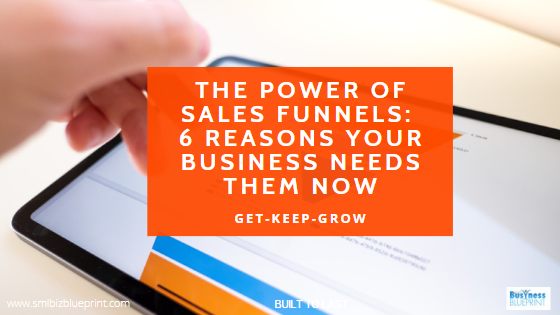In today’s fast-paced digital landscape, a strategic approach to marketing and sales is crucial for businesses of all sizes.
One powerful strategy that stands out among the rest is the implementation of sales funnels.
Let’s guide you through the concept of sales funnels, how they work, and the six compelling reasons why your business needs one.
A sales funnel is a systematic process that guides potential customers through a series of steps, gradually nurturing and converting them into paying customers. Imagine a funnel-shaped device where you pour in a wide range of leads at the top, and as they move down the funnel, they undergo various stages that ultimately lead to a sale.

Let’s break down the stages of a typical sales funnel:
Awareness:
At the top of the funnel, your primary goal is to attract the attention of your target audience.
This is where you employ various marketing tactics, such as content marketing, social media advertising, and search engine optimization, to generate awareness and capture the interest of potential customers.
Interest:
Once you’ve caught the attention of your prospects, the next step is to nurture their interest.
This involves providing valuable content, such as blog posts, videos, or webinars, that educates and engages your audience. The goal here is to position yourself as an authority in your industry and build trust with your potential customers.
Evaluation:
As your prospects move further down the funnel, they enter the evaluation stage.
At this point, they are considering different options and comparing them to make an informed decision. It’s essential to showcase your products or services’ unique value and benefits through case studies, testimonials, and persuasive messaging.
Decision:
In the decision stage, your prospects are ready to make a purchase.
This is where you present compelling offers, such as exclusive discounts, limited-time promotions, or bonuses, to encourage them to take the final step and become paying customers.
Action:
Once your prospects have purchased, the sales funnel doesn’t end there.
The goal is to turn them into loyal customers who return for more. This can be achieved through post-purchase follow-ups, personalised recommendations, and exceptional customer service.

Now that we have a clear understanding of how sales funnels work let’s explore the six reasons why your business needs one:
#1 Build an Experience: Establishing Trust and Value
Trust is not automatically granted when people first hear about your business, and immediate purchases are unlikely.
To thrive in the online marketing landscape, you must build an experience that cultivates trust and demonstrates your value.
It’s crucial to generate leads, nurture relationships, and make compelling offers periodically.
Creating a sales funnel experience establishes credibility, develops trust, and guides potential customers towards becoming loyal buyers.
For example, consider a scenario where a potential customer discovers your business through an advertisement. Instead of trying to sell them your product directly, you can offer them valuable content, such as a free e-book or a helpful video, in exchange for their email address.
By doing so, you begin to build a relationship, demonstrate expertise, and lay the foundation for future sales.
#2 Increase Average Order Value: Maximizing Revenue
Sales funnels excel at maximising revenue by utilising upsells, down sells, and order bumps.
After a customer commits to purchasing one item, they are most receptive to additional offers.
You can significantly increase the average order value by strategically presenting complementary products or services during the checkout process.
Human psychology plays a crucial role in this process. When customers are in a buying mindset, they are more likely to consider purchasing related items.
By leveraging sales funnels, you capitalise on this psychological tendency, leading to increased revenue for your business.
For instance, imagine you sell photography equipment online. When customers add a camera to their shopping cart, you can offer them a bundle with additional lenses, a tripod, and a carrying case at a discounted price. This not only enhances their shopping experience but also boosts your sales.

#3 Beat Procrastination: Overcoming Resistance to Action
Procrastination is a prevalent trait among people.
When it comes to making purchasing decisions, individuals often hesitate, finding various reasons to delay or avoid committing.
This behaviour stems from “risk aversion,” where individuals fear taking significant risks.
Sales funnels effectively address this procrastination tendency by alleviating the perceived risks.
Techniques such as money-back guarantees, creating a sense of urgency, and incorporating storytelling and testimonials all contribute to overcoming resistance and encouraging immediate action.
For example, if you offer a service, you can provide a risk-free trial period to ease potential customers’ concerns. By highlighting success stories and customer testimonials, you instil confidence and demonstrate the positive outcomes of your offering.
#4 Target Your Dream Customer: Precision in Marketing
To build a thriving business, you must understand your target audience inside out.
Take the time to create a detailed customer avatar, complete with a name, defining characteristics, demographics, interests, behaviours, desires, and fears.
The better you understand your audience, the more effectively you can sell to them.
Developing an effective sales funnel requires a deep dive into your target market. You must know who you’re talking to before crafting compelling messages, offers, and funnel experiences.
By aligning your sales funnel with your ideal customer’s needs and desires, you can tailor your marketing efforts to resonate with them on a personal level.
For instance, if your business provides fitness coaching services for busy professionals, your customer avatar may be “John,” a 35-year-old office worker who wants to stay fit but struggles to find time for exercise.
By understanding John’s specific challenges and desires, you can create a sales funnel that addresses his pain points and offers a solution that fits his busy lifestyle.

#5 Build an Audience: Cultivate Authentic Relationships
Today’s online buyers are highly sophisticated. They conduct extensive research, read reviews, seek testimonials and case studies, and consult their social networks before purchasing.
However, a way to bypass this initial scepticism is to build authentic relationships with your audience.
This is a crucial aspect of the sales funnel process. You can establish yourself as a trusted authority in your industry by offering valuable content, engaging in meaningful conversations, and providing personalised experiences.
You can nurture these relationships and create a loyal community of customers through effective email marketing and social media engagement.
For example, if you run a home decor business, you can regularly send out newsletters featuring design tips, exclusive discounts, and customer success stories.
By consistently providing value and engaging with your audience, you foster a sense of trust and loyalty, increasing the likelihood of repeat purchases.
#6 Learn from Competitors: Leverage Existing Success
Market research plays a vital role in building a successful sales funnel.
Take the time to analyse your competitors’ sales funnels, focusing on the most crucial elements.
While it’s important not to simply copy and paste, you can glean valuable insights, ideas, and concepts from their success stories.
By examining what works well in your industry, you can adapt and tailor those strategies to fit your own sales funnel.
This saves you from starting from scratch and guessing what might resonate with your target market. By leveraging the proven tactics of your competitors, you can refine your approach and build an effective sales funnel more efficiently.
For instance, if you’re a software-as-a-service (SaaS) provider, study the sales funnels of other successful SaaS companies in your niche.
Analyse their landing pages, email sequences, and promotional strategies. This research will help you identify the key elements that drive conversions and enable you to build a sales funnel that aligns with your business goals.
In conclusion, a sales funnel is a vital tool for any business seeking success in the digital marketplace.
You can drive your business towards sustainable growth and profitability by building an experience that establishes trust, increasing average order value, addressing procrastination tendencies, understanding your dream customer, cultivating an audience, and learning from your competitors.
Embrace the power of sales funnels and unlock the full potential of your business in the online world.




